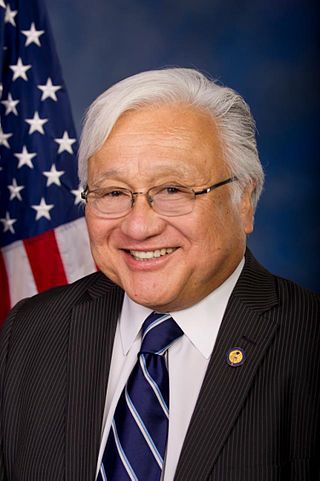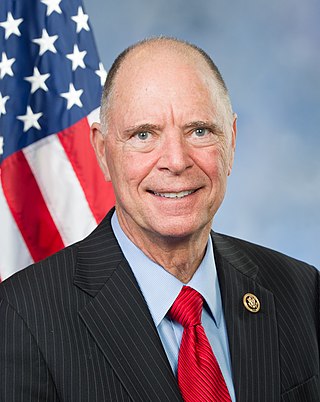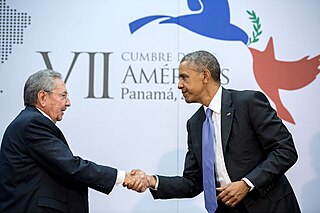
The Cuban Liberty and Democratic Solidarity (Libertad) Act of 1996, Pub. L.Tooltip Public Law 104–114 (text)(PDF), 110 Stat. 785, 22 U.S.C. §§ 6021–6091) is a United States federal law which strengthens and continues the United States embargo against Cuba. It extended the territorial application of the initial embargo to apply to foreign companies trading with Cuba, and penalized foreign companies allegedly "trafficking" in property formerly owned by U.S. citizens but confiscated by Cuba after the Cuban revolution. It also covers property formerly owned by Cubans who have since become U.S. citizens.

Michael Makoto Honda is an American politician and former educator. A member of the Democratic Party, he served in Congress from 2001 to 2017.

Ileana Ros-Lehtinen is a politician and lobbyist from Miami, Florida, who represented Florida's 27th congressional district from 1989 to 2019. By the end of her tenure, she was the most senior U.S. Representative from Florida. She was Chairwoman of the House Foreign Affairs Committee from 2011–2013. In 1989, Ros-Lehtinen won a special election and became the first Cuban American elected to Congress. She was also the first Republican woman elected to the House from Florida. Ros-Lehtinen gave the first Republican response to the State of the Union address in Spanish in 2011, and gave the third in 2014.
The Employment Non-Discrimination Act (ENDA) is legislation proposed in the United States Congress that would prohibit discrimination in hiring and employment on the basis of sexual orientation or, depending on the version of the bill, gender identity, by employers with at least 15 employees.

Dante Bruno Fascell was an American politician who represented Florida as a member of the United States House of Representatives from 1955 to 1993. He served as chairman of the House Foreign Affairs Committee for nine years.

The United States embargo against Cuba prevents US businesses, and businesses organized under US law or majority-owned by US citizens, from conducting trade with Cuban interests. It is the most enduring trade embargo in modern history. The US first imposed an embargo on the sale of arms to Cuba on March 14, 1958, during the Fulgencio Batista regime. Again on October 19, 1960, almost two years after the Cuban Revolution had led to the deposition of the Batista regime, the U.S. placed an embargo on exports to Cuba except for food and medicine after Cuba nationalized the US-owned Cuban oil refineries without compensation. On February 7, 1962, the embargo was extended to include almost all exports. The United Nations General Assembly has passed a resolution every year since 1992 demanding the end of the US economic embargo on Cuba, with the US and Israel being the only nations to consistently vote against the resolutions.

The Development, Relief, and Education for Alien Minors Act, known as the DREAM Act, is a United States legislative proposal to grant temporary conditional residency, with the right to work, to undocumented immigrants who entered the United States as minors—and, if they later satisfy further qualifications, they would attain permanent residency.
The Cuban–American lobby are various groups of Cuban exiles in the United States and their descendants who have historically influenced the United States' policy toward Cuba. In general usage, this refers to anti-Castro groups.

Cuba and the United States restored diplomatic relations on July 20, 2015, after relations had been severed in 1961 during the Cold War. U.S. diplomatic representation in Cuba is handled by the United States Embassy in Havana, and there is a similar Cuban Embassy in Washington, D.C. The United States, however, continues to maintain its commercial, economic, and financial embargo, making it illegal for U.S. corporations to do business with Cuba.

William Joseph Posey is an American businessman and politician serving as the U.S. representative for Florida's 8th congressional district, in Congress since 2009. A member of the Republican Party, he formerly served in the Florida Senate and the Florida House of Representatives.
The Military Readiness Enhancement Act was a bill introduced in the U.S. House of Representatives in several sessions between 2005 and 2009. It would have amended title 10, United States Code to include a policy of nondiscrimination on the basis of sexual orientation, replacing the policy known as "Don't ask, don't tell" (DADT), which banned disclosing one's homosexuality while serving in the Armed Forces.
The Tax Parity for Health Plan Beneficiaries Act is a bill in the 112th Congress that would equalize tax treatment for employer-provided health coverage for domestic partners and other non-spouse, non-dependent beneficiaries."

Gerald Edward Connolly is an American politician serving as the U.S. representative for Virginia's 11th congressional district, first elected in 2008. The district is anchored in Fairfax County, an affluent suburban county west of Washington, D.C. It includes all of Fairfax City and part of Prince William County. Connolly is a member of the Democratic Party.
The Federal Reserve Transparency Act of 2015 was a bill introduced in the U.S. House of Representatives of the 114th United States Congress by Congressman Thomas Massie (KY-4). It included proposals for a reformed audit of the Federal Reserve System. The Senate version was introduced by Senator Rand Paul (R-KY)..

The Shark Conservation Act of 2009 (SCA) was passed by the 111th United States Congress that amended the High Seas Driftnet Fishing Moratorium Protection Act and the Magnuson–Stevens Fishery Conservation and Management Act to improve the conservation of sharks. The bill was approved by the House of Representatives on March 2, 2009 by voice vote. It was taken up by the Senate and amended to incorporate further changes to Magnuson-Stevens, known as the International Fisheries Agreement Clarification Act. The Senate passed the amended bill as the Shark Conservation Act of 2010 on December 20, 2010 by unanimous consent, and the next day the House accepted the amendment, again by voice vote. The bill was signed into law by President Barack Obama on January 4, 2011.
The Comprehensive Iran Sanctions, Accountability, and Divestment Act of 2010 is a law passed by the U.S. Congress that applies further sanctions on the government of Iran.
The Affordable Health Care for America Act was a bill that was crafted by the United States House of Representatives of the 111th United States Congress on October 29, 2009. The bill was sponsored by Representative Charles Rangel. At the encouragement of the Obama administration, the 111th Congress devoted much of its time to enacting reform of the United States' health care system. Known as the "House bill,” HR 3962 was the House of Representatives' chief legislative proposal during the health reform debate.

The Research Works Act, 102 H.R. 3699, was a bill that was introduced in the United States House of Representatives at the 112th United States Congress on December 16, 2011, by Representative Darrell Issa (R-CA) and co-sponsored by Carolyn B. Maloney (D-NY). The bill contained provisions to prohibit open-access mandates for federally funded research and effectively revert the United States' National Institutes of Health Public Access Policy, which requires taxpayer-funded research to be freely accessible online. If enacted, it would have also severely restricted the sharing of scientific data. The bill was referred to the House Committee on Oversight and Government Reform, of which Issa is the chair. Similar bills were introduced in 2008 and 2009 but have not been enacted since.

The Ending Federal Marijuana Prohibition Act is a series of federal marijuana decriminalization bills that have been introduced multiple times in the United States Congress.

The Cuban thaw was the normalization of Cuba–United States relations that began in December 2014 ending a 54-year stretch of hostility between the nations. In March 2016, Barack Obama became the first U.S. president to visit Cuba since Calvin Coolidge in 1928. The normalization of relations between the United States and Cuba was relatively short lived, with much of the diplomatic progress that was made later being undone by the Trump administration.








